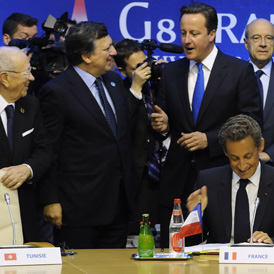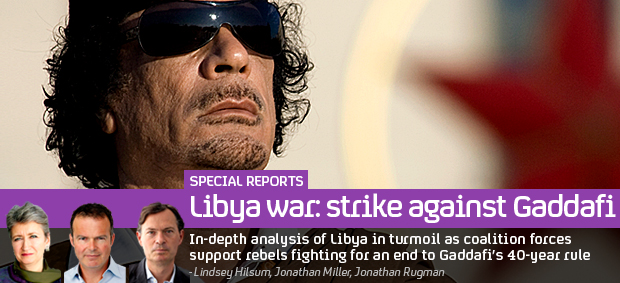Billions in G8 aid promised for Arab Spring nations
The G8 summit in France has ended with a pledge of billions of dollars of aid for countries involved in the Arab Spring uprisings.

The aid deal will see $20bn distributed to Tunisia and Egypt, which are facing economic uncertainty following popular revolts. Among other things, it will be used to support the development of free media in nations involved in the Arab Uprisings.
However, the money is likely to be in the form of multilateral loans rather than grants. More cash has been pledged by Gulf Arab nations, believed to be in the region of $10bn.
In spite of the deal, the Group of Eight leading nations failed to agree on action against Syria. However, Prime Minister David Cameron insisted that he remained hopeful of securing a United Nations Security Council resolution.
Read more: Syrian forces open fire on protestors
The Prime Minister said that unlike the UK, some countries were willing to give the Syrian regime more time to end repression, which is the reason for the weakening of the line taken by the G8. Moscow was reported to be behind a watering down of the final communique, which promised only that the G8 would “consider further measures”.
The communique merely criticised Syria for its crackdown on protestors.
Russian help offer
Meanwhile, Russia’s offer to “help Muammar Gaddafi leave power” was flatly rebuffed by the French President Nicolas Sarkozy, who said it was not possible to mediate with the Libyan leader.
Russian Deputy Foreign Minister Sergei Ryabkov had said: “If the respectful tone that Russia maintains in its dialogue with the Libyan authorities would help Mr Gaddafi take the right decision, I think this will become our most serious and significant contribution to the resolution of the grave and potentially even more dangerous situation for Libya and the region.”
But later, a White House official said the United States believed Russia could help resolve the Libya crisis.
“We believe Russia has a role to play going forward as a close partner of ours,” U.S. deputy national security adviser Ben Rhodes said.
“There’s an agreement that the Libyan people deserve a better future and we are going to be in close touch with the Russians as they pursue their conversations with the Libyans,” Rhodes said.
Apache helicopters to be sent to region
Earlier, the British government confirmed it would be putting four Apache helicopters at the disposal of NATO forces. David Cameron said it was time to “ratchet up” pressure on the Libyan regime to go.
He said: “Now there are signs that the momentum against Gaddafi is building. We know that we are on the right side, we’re doing the right thing, the pressure is telling.”
The announcement follows France’s decision to send 12 Tiger and Gazelle helicopters to the region.
-
Latest news
-
As India goes to the polls in the world’s largest election – what do British-Indians think?6m

-
Tees Valley: Meet the candidates in one of the biggest contests coming up in May’s local elections4m

-
Keir Starmer says public sector reform will be a struggle7m

-
Nicola Sturgeon’s husband Peter Murrell charged with embezzlement of funds from SNP1m

-
Ukraine might finally get $60billion in American weapons and assistance to defend against Russia3m

-





